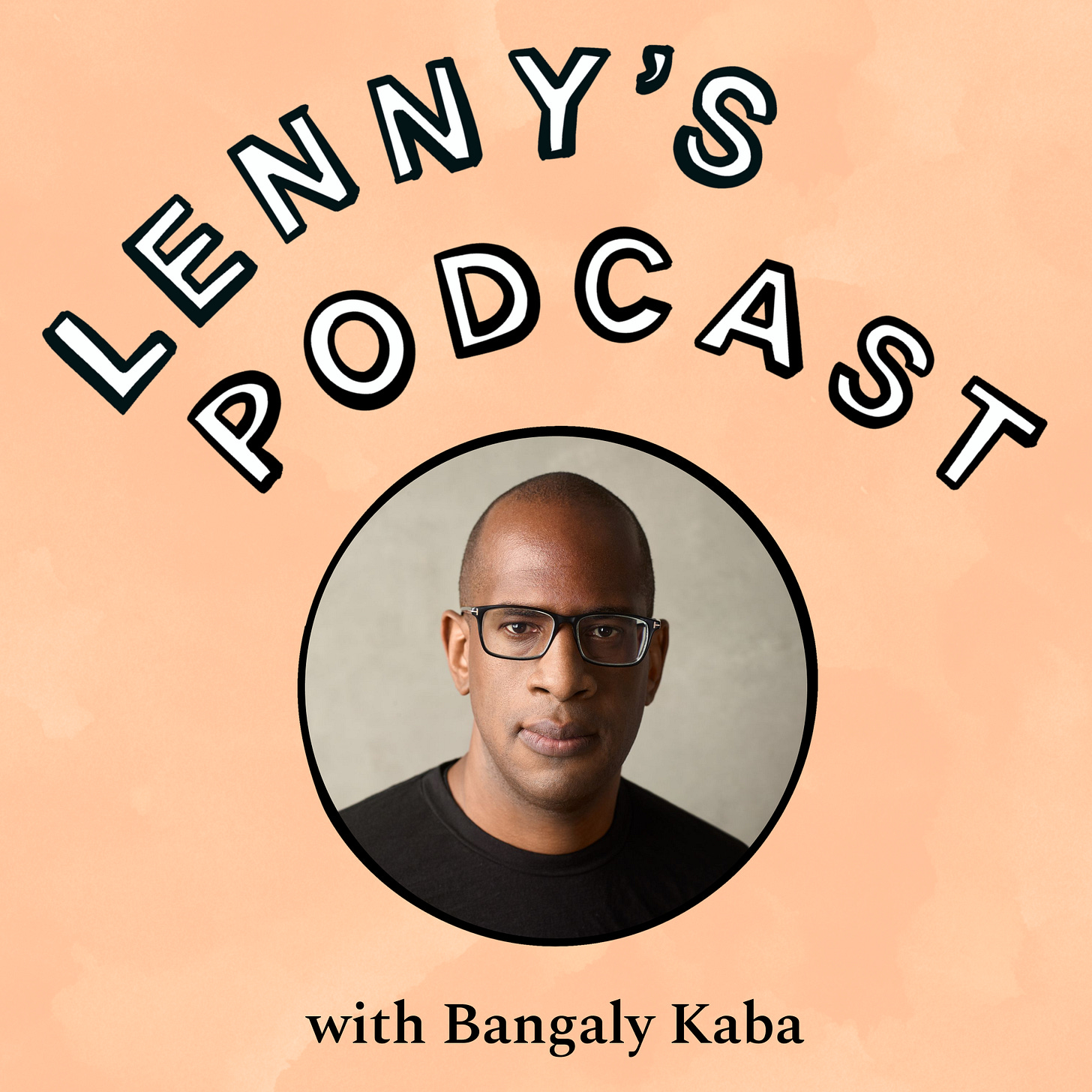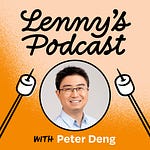Brought to you by:
• Uizard—AI-powered prototyping for visionary product leaders
• Mercury—The powerful and intuitive way for ambitious companies to bank
• Vanta—Automate compliance. Simplify security.
—
Bangaly Kaba was an early growth PM at Facebook, head of growth at Instagram, and VP of Product at Instacart and is currently Director of Product at YouTube overseeing a global team working on creator monetization. Bangaly has also been a growth advisor to dozens of companies, including Twitter, on the board of multiple companies, and is an active angel investor. In our conversation, we discuss:
A simple framework for choosing where to work and what to work on
The importance of “understand work”
The “adjacent users” theory and how it can help you drive growth
Advice for coaching product managers
Invaluable lessons from his time at Instagram, Facebook, and YouTube
Much more
Some takeaways:
To advance your career, focus on creating impact: impact = skills x environment.
Environment is everything that enables you to do great work that is outside of your direct control, including: manager, resources, team, scope, compensation, and culture.
Skills are things that are within your direct control that enable your success: communication (the most impactful), influence/leadership, strategic thinking, and execution.
Understanding “adjacent users” can be a key to unlocking new stages of growth. Adjacent users are the next segment of people who can benefit from your product and are showing interest but are not quite converting and retaining how you’d hope. You can identify these users by looking for cohorts showing signals that your product is almost a fit (e.g. signing up) but not quite working (e.g. churning at high rates). For example, at one point, Instacart’s core user base may have been office admins ordering food for their staff, but the adjacent user was a mom of four ordering groceries. The mom of four has very different needs, so it would be important for Instacart to build for those in order to grow into the new segment.
Bangaly says to view product management as analogous to coaching a sports team. Just like in sports, not everyone needs to be a star player, but everyone plays a crucial role in achieving success. Similarly, the success of individual team members reflects back on the leader. Investing time and effort into coaching and developing team members not only benefits them but also enhances the leader’s effectiveness in their role.
Before executing on a product idea, do “understand work” to truly understand pain points, alternatives, and, ultimately, the best opportunities. Too often, teams have an idea, find some data to justify it, and then start executing. And too often, this leads to failed experiments. Instead, invest time up front in understanding what is happening through things like data instrumentation, data analysis, or talking to users. This translates to “going slow to go fast” because the up-front investment will turn into much higher experiment win rates, especially as lessons compound over time.
Use the “Managing Complex Change” framework to diagnose and solve barriers to change in a given team or area. The framework lays out five things a team needs in order to change:
Vision
Skills
Incentives
Resources
Action plan
If you are missing any one of these, you get a different style of negative outcome, instead of the change you want. For example, having everything except vision causes confusion, and having everything except the right incentives causes resistance. Since these negative outcomes can be felt and observed in the team, you can work backward from them to their cause. Once you know the precise cause, you can solve it to unlock change.
Listen now on Apple, Spotify, and YouTube.
Where to find Bangaly Kaba:
• X: https://twitter.com/iambangaly
• LinkedIn: https://www.linkedin.com/in/iambangaly/
• Instagram: https://www.instagram.com/iambangaly/
In this episode, we cover:
(00:00) Bangaly’s background
(06:31) Choosing where to work and what to work on
(08:39) The impact factor
(10:53) Evaluating the environment
(15:53) The manager component
(18:27) The skills part of the equation
(23:49) Advice on finding a mentor
(25:42) The power of “understand work”
(31:17) Operationalizing understand work
(37:55) Balancing understand work
(41:25) Managing complex change
(45:26) Effective management of product managers
(51:35) The role of product managers as coaches and team leaders
(54:52) Driving growth through flywheels and value proposition
(01:03:14) Understanding adjacent users
(01:08:41) The role of partnerships and SEO in Instagram’s early growth
(01:16:08) The secret behind Instagram’s growth
(01:25:37) Lessons from Facebook
(01:29:15) Failure corner
(01:31:58) Lightning round
Referenced:
• Impact = Environment x Skills: How to Make Career Decisions: https://www.reforge.com/blog/how-to-make-career-decisions
• Thinking beyond frameworks | Casey Winters (Pinterest, Eventbrite, Airbnb, Tinder, Canva, Reddit, Grubhub): https://www.lennysnewsletter.com/p/thinking-beyond-frameworks-casey
• Casey Winters’s blog: https://caseyaccidental.com/
• Ben Thompson’s newsletter: https://stratechery.com/about/
• Elena Verna on how B2B growth is changing, product-led growth, product-led sales, why you should go freemium not trial, what features to make free, and much more: https://www.lennysnewsletter.com/p/elena-verna-on-why-every-company
• George Lee on LinkedIn: https://www.linkedin.com/in/geolee/
• Bangaly Kaba: The Path to 1 Billion: Lessons Learned from Growing Instagram—CXL LIVE 2018: https://www.youtube.com/watch?v=L9ZHlb6kj_E
• What Is ‘Dogfooding’?: https://www.nytimes.com/2022/11/14/business/dogfooding.html
• Bloom’s taxonomy: https://en.wikipedia.org/wiki/Bloom%27s_taxonomy
• Kevin Systrom on LinkedIn: https://www.linkedin.com/in/kevinsystrom/
• Mike Krieger on LinkedIn: https://www.linkedin.com/in/mikekrieger/
• LeBron James: https://en.wikipedia.org/wiki/LeBron_James
• Kobe Bryant: https://en.wikipedia.org/wiki/Kobe_Bryant
• Mike Krzyzewski: https://en.wikipedia.org/wiki/Mike_Krzyzewski
• John Calipari: https://en.wikipedia.org/wiki/John_Calipari
• Stripe: https://stripe.com/
• Chief: https://chief.com/
• Jobs to be done framework: https://jobs-to-be-done.com/jobs-to-be-done-a-framework-for-customer-needs-c883cbf61c90
• The Adjacent User: https://brianbalfour.com/quick-takes/the-adjacent-user
• How the biggest consumer apps got their first 1,000 users: https://www.lennysnewsletter.com/p/how-the-biggest-consumer-apps-got
• Alex Zhu on LinkedIn: https://www.linkedin.com/in/keepsilence/
• From Brush to Canvas with Alex Zhu of Musical.ly: https://www.youtube.com/watch?v=ey15v81pwII
• Selena Gomez on Instagram: https://www.instagram.com/selenagomez/
• Kim Kardashian on Instagram: https://www.instagram.com/kimkardashian/
• Rob Andrews on LinkedIn: https://www.linkedin.com/in/robby-andrews-64669720/
• Instagram’s growth speeds up as it hits 700 million users: https://techcrunch.com/2017/04/26/instagram-700-million-users/
• Range: Why Generalists Triumph in a Specialized World: https://www.amazon.com/Range-Generalists-Triumph-Specialized-World/dp/0735214484
• Deep Work: Rules for Focused Success in a Distracted World: https://www.amazon.com/Deep-Work-Focused-Success-Distracted/dp/1455586692
• Start at the End: How to Build Products That Create Change: https://www.amazon.com/Start-End-Products-Create-Change/dp/0525534423
• Flighty app: https://www.flightyapp.com/
• Adam Grant on Instagram: https://www.instagram.com/adamgrant/
Production and marketing by https://penname.co/. For inquiries about sponsoring the podcast, email podcast@lennyrachitsky.com.
Lenny may be an investor in the companies discussed.















Share this post